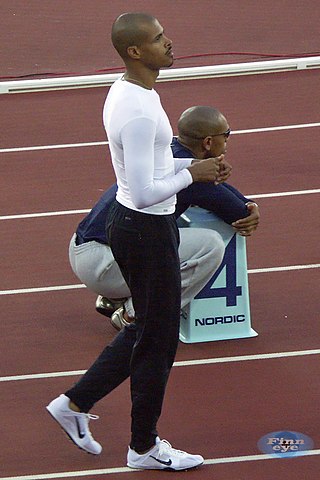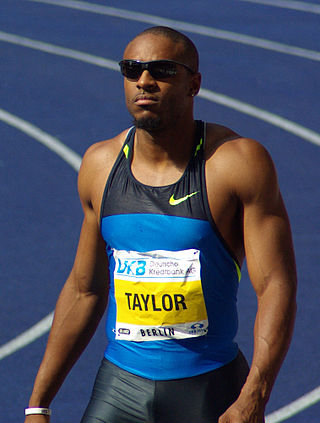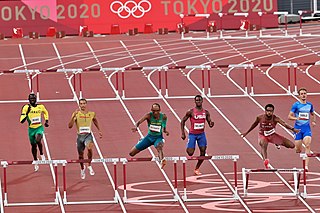
The men's 400 metres hurdles at the 2004 Summer Olympics as part of the athletics program were held at the Athens Olympic Stadium from August 23 to 26. There were 35 competitors from 24 nations. The event was won by Félix Sánchez of the Dominican Republic, the nation's first medal in the men's 400 metres hurdles. Silver went to Danny McFarlane of Jamaica, returning to the podium in the event for the first time since 1992. Naman Keïta's bronze was France's first medal in the event in over 100 years; the last Frenchman to medal in the long hurdles was Henri Tauzin in 1900. The United States' five-Games gold medal streak ended; for only the second time in the history of the event, Americans competed but won no medals.
The women's 400 metres hurdles at the 2004 Summer Olympics as part of the athletics program were held at the Athens Olympic Stadium from August 21 to 25.

Kerron Stephon Clement is a Trinidadian-born American track and field athlete who competes in the 400-meter hurdles and 400-meter sprint. He held the indoor world record in the 400-meter sprint, having broken Michael Johnson's mark in 2005.

The men's 400 metres hurdles at the 2008 Summer Olympics took place on 16–18 August at the Beijing National Stadium. There were 26 competitors from 19 nations. The event was won by Angelo Taylor of the United States, the nation's 18th victory in the men's 400 metres hurdles. Taylor was the seventh man to win multiple medals in the event, and third to win two golds. The United States completed its fifth podium sweep in the men's long hurdles, as Kerron Clement and Bershawn Jackson took silver and bronze.

Javier Culson Pérez is a Puerto Rican athlete and Olympiad bronze medalist who specialises in the 400-metre hurdles. After becoming involved with the discipline in his late teen years, he entered the podium in some regional youth events, including the Pan American Junior Athletics Championships. Culson is a two-time silver medallist at the International Association of Athletics Federations's (IAAF) World Championships and an elite contender in the Samsung Diamond League, where he finished second overall in 2011. He has also garnished medals in events with lower profiles, including the Central American and Caribbean Games and the Ibero-American Championships. He currently holds the record as "the world's fastest man" in that category. Culson also competed at the 2012 Olympics in London winning the bronze medal in the 400-metre hurdles race. In the 2016 Olympics in Rio, Culson made it all the way to the finals of the men's 400m hurdles only to be disqualified by a false start.
The men's 400 metres hurdles at the 2009 World Championships in Athletics was held at the Olympic Stadium on 15, 16 and 18 August.

The men's 400 metres competition at the 2012 Summer Olympics in London, United Kingdom, was held at the Olympic Stadium on 4–6 August. Forty-nine athletes from 38 nations competed. The event was won by 0.52 seconds by Kirani James of Grenada, earning the country its first Olympic medal. Luguelín Santos's silver was the Dominican Republic's first medal in the men's 400 metres. Lalonde Gordon's bronze was Trinidad and Tobago's first medal in the event since 1964.

The men's 400 metres hurdles competition at the 2012 Summer Olympics in London, United Kingdom took place on 3–6 August at the Olympic Stadium. There were 49 competitors from 33 nations. The event was won by Félix Sánchez of the Dominican Republic, the second victory in the men's long hurdles for both the man and the nation. Sánchez was the eighth man to win multiple medals in the event and fourth to win two golds. Michael Tinsley of the United States earned silver. Javier Culson's bronze was Puerto Rico's first medal in the event.
Maoulida Darouèche is a Comoran hurdler who specialises in the 400 metres hurdles and who has also competed in the javelin throw. Darouèche competed in the 2012 Summer Olympics and the 2016 Summer Olympics. At both Olympics he competed in the 400 metres hurdles. He has also competed in two World Championships, an African athletics championships and a Jeux de la Francophonie.

The men's 400 metres hurdles at the 2013 World Championships in Athletics was held at the Luzhniki Stadium on 12–15 August.

Yasmani Copello Escobar is a Cuban-born track and field hurdler who represents Turkey internationally. His personal best for the 400 metres hurdles is 47.81 seconds, set in the final of the 2018 European Athletics Championships in Berlin.

The men's 400 metres event at the 2016 Summer Olympics took place between 12 and 14 August at the Olympic Stadium. Fifty-three athletes from 35 nations competed. The event was won by 0.73 seconds by Wayde van Niekerk of South Africa, who broke the world record in the 400m and won the nation's second gold medal in the men's 400 metres. Kirani James of Grenada and LaShawn Merritt of the United States became the sixth and seventh men to win two medals in the event, but Michael Johnson remained the only man with two gold medals.

The men's 800 metres event at the 2016 Summer Olympics took place between 12–15 August at the Olympic Stadium. Fifty-eight athletes from 39 nations competed. The event was won by 0.46 seconds by David Rudisha of Kenya, the fourth man to successfully defend Olympic gold in the 800 metres. Taoufik Makhloufi of Algeria took silver, the first medal for the nation in the 800 metres since 2000. The United States had an even longer medal-less streak broken, as Clayton Murphy's bronze was their first since 1992.

The men's 110 metres hurdles event at the 2016 Summer Olympics took place between 15–16 August at the Olympic Stadium. Forty athletes from 27 nations competed. The event was won by Omar McLeod of Jamaica, the nation's first gold medal and second medal overall in the event. Orlando Ortega's silver was Spain's first medal in the men's high hurdles, while Dimitri Bascou's bronze was France's first medal in the event since 1976.

Nicholas Kiplagat Bett was a Kenyan track and field athlete who competed in the 400 metres hurdles. His personal best for the event is 47.79 seconds. He was a world champion in the event, having won in 2015, and a two-time bronze medallist at the African Championships in Athletics. He died in a road accident in Kenya at the age of 28.
The men's 400 metres hurdles at the 2015 World Championships in Athletics was held at the Beijing National Stadium on 22, 23 and 25 August.
The men's 400 metres hurdles at the 2017 World Championships in Athletics was held at the London Olympic Stadium on 6–9 August.

Abderrahman Almoubarrake Samba Alsaleck is a Qatari male track and field athlete who specialises in the 400 metres hurdles. He was born and grew up in Saudi Arabia but chose to represent Mauritania – his father's homeland – before eventually switching allegiance to Qatar and moving to Doha in 2015. He became eligible to compete for his adopted country in May 2016. He was the second person to run the 400m hurdle event in less than 47 seconds.

The men's 400 metres hurdles event at the 2020 Summer Olympics took place between 30 July and 3 August 2021 at the Olympic Stadium. 36 athletes from 26 nations competed.

The women's 400 metres hurdles event at the 2020 Summer Olympics took place between 31 July and 4 August 2021 at the Japan National Stadium. 39 athletes from 25 nations competed.













